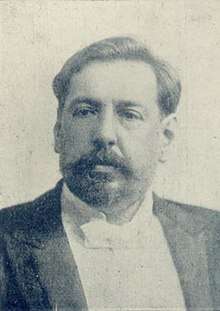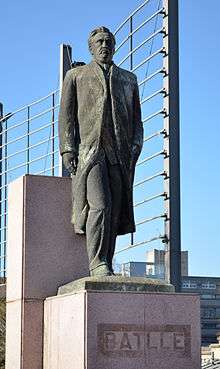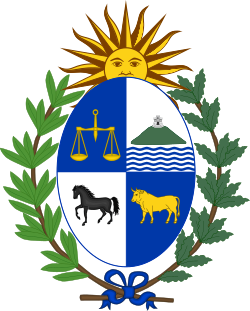José Batlle y Ordóñez
José Pablo Torcuato Batlle y Ordóñez (born 23 May 1856 in Montevideo, Uruguay – 20 October 1929) was a prominent Uruguayan politician, who served two terms as President of Uruguay for the Colorado Party. He was the son of a former president and was widely praised for his introduction of the political system Batllismo to South America, and his role in creating the modern Uruguay through his extensive welfare state reforms.
José Batlle y Ordóñez | |
|---|---|
 José Batlle y Ordóñez | |
| 19th and 21st President of Uruguay | |
| In office 1 March 1911 – 1 March 1915 | |
| Preceded by | Claudio Williman |
| Succeeded by | Feliciano Viera |
| In office 1 March 1903 – 1 March 1907 | |
| Preceded by | Juan Lindolfo Cuestas |
| Succeeded by | Claudio Williman |
| In office 5 February 1899 – 1 March 1899 Acting | |
| Preceded by | Juan Lindolfo Cuestas |
| Succeeded by | Juan Lindolfo Cuestas |
| 2nd and 5th Prime Minister of Uruguay | |
| In office 1 March 1921 – 1 March 1923 | |
| President | Baltasar Brum |
| Preceded by | Feliciano Viera |
| Succeeded by | Julio María Sosa |
| In office 1 March 1927 – 16 February 1928 | |
| President | Juan Campisteguy |
| Preceded by | Luis Alberto de Herrera |
| Succeeded by | Luis Caviglia |
| Personal details | |
| Born | May 21, 1856 Montevideo, Uruguay |
| Died | October 20, 1929 (aged 73) Montevideo, Uruguay |
| Nationality | Uruguayan |
| Political party | Colorado Party |
| Spouse(s) | Matilde Pacheco |
| Children | César Rafael Lorenzo Amalia Ana Ana Amalia |
| Occupation | Journalist |
Part of a series on the |
|---|
| History of Uruguay |
 |
|
Early History
|
|
Independent State |
|
20th Century
|
|
Military Regime
|
|
Modern Uruguay
|
|
|
In 1898, for a few weeks he served as interim president and later was elected to the presidency for two terms, from 1903 until 1907 and from 1911 to 1915. He remains one of the most popular Uruguayan presidents, in part due to his role as a social reformer. He is known for introducing unemployment compensation, eight-hour workdays, and universal suffrage, as well as free High School education.
Background
Batlle family are some of the most prominent members of the Colorado Party. He was the son of former President Lorenzo Batlle y Grau. His children César, Rafael and Lorenzo were actively engaged in politics. He was the uncle of another Uruguayan President, Luis Batlle Berres and the great-uncle of President Jorge Batlle.
He was a prominent journalist, who founded El Día newspaper in 1886. Batlle used his newspaper as a political platform for criticizing his opponents and promoting his reformist agenda.
He served as the President of the Senate of Uruguay from 1899 to 1900, and in 1903.[1]
Presidency
First term
In 1904 Batlle's government forces successfully ended the intermittent Uruguayan Civil War which had persisted for many years, when the opposing National Party leader Aparicio Saravia was killed at the battle of Masoller. Without their leader, Saravia's followers abandoned their fight, starting a period of relative peace.
During Batlle y Ordóñez's term in office, secularization became a major political issue. Uruguay banned crucifixes in hospitals by 1906, and eliminated references to God and the Gospel in public oaths. Divorce laws were also established during this time. He led Uruguay's delegation to the Second Hague Conference and was noted for his peace proposals there.[2] Much of the time between his two terms Batlle spent travelling in Europe and picking up ideas for new political and social reforms, which he introduced during his second term.
Second term
In 1913, Batlle proposed a reorganization of the government which would replace the presidency by a nine-member National Council of Administration, similar to the Swiss Federal Council. Batlle’s proposal for a collective leadership body was defeated in 1916 referendum, but he managed to establish a model in which executive powers were split between the Presidency and the National Council of Administration when a variant of his proposal was implemented with the Constitution of 1918.
Economy
During Batlle's second term, he began a new movement and referred to as Batllismo: concerted state action against foreign economic imperialism. During this time he fought for such things as unemployment compensation (1914), eight-hour workdays (1915), and universal suffrage. As President, Battle introduced a wide range of reforms in areas such as social security and working conditions.
All of this brought a great government involvement into the economy. Private monopolies were turned into government monopolies and tariffs were imposed on foreign products, including machinery and raw material imports. The growth of the meat processing industry stimulated the livestock industry, Uruguay's main source of wealth.
Education
Education started a process of great expansion since the mid-to-late 19th century. It became the key to success for the middle class community. The state approved free high school education and created more high schools through the country. The university was also opened to women, and the enrollment increased throughout the country.
Later life

In 1920 Batlle killed Washington Beltrán Barbat, a National Party deputy, in a formal duel that stemmed from vitriolic editorials published in Batlle's 'El Día' newspaper and Beltrán's 'El País'.[3] His son Washington Beltrán would become President of Uruguay. He also served twice as Chairman of the National Council of Administration (1921-1923, 1927-1928).
Legacy
A public park and a neighborhood in Montevideo are named after him.
There is also a town in Lavalleja Department named after him.
See also
References
- PRESIDENCIA DE LA ASAMBLEA GENERAL Y DEL SENADO PRESIDENCIA DE LA CAMARA DE REPRESENTANTES (October 29, 2013). "Parlamentarios Uruguayos 1830-2005" (PDF). www.parlamento.gub.uy. Archived from the original (PDF) on October 29, 2013.
- "A Basis for a League of Peace". The Independent. Jul 20, 1914. Retrieved August 21, 2012.
- https://timesmachine.nytimes.com/timesmachine/1920/05/16/112660994.pdf
External links
| Wikimedia Commons has media related to José Batlle y Ordóñez. |
| Political offices | ||
|---|---|---|
| Preceded by Juan Lindolfo Cuestas |
President of Uruguay Acting 1899 |
Succeeded by Juan Lindolfo Cuestas |
| Preceded by Juan Lindolfo Cuestas |
President of Uruguay 1903–1907 |
Succeeded by Claudio Wílliman |
| Preceded by Claudio Wílliman |
President of Uruguay 1911–1915 |
Succeeded by Feliciano Viera |
| Preceded by Feliciano Viera |
Prime Minister of Uruguay 1921–1923 |
Succeeded by Julio María Sosa |
| Ancestors of José Batlle y Ordóñez | ||||||||||||||||||||||||||||||||||||||||||||||||||||||||||||||||||||||||||||||||||||||||||||||||||||||||||||||||||||||||||||||||||||||||||||||||||||||||||||||||||||||||||||||||||||||||||||||||||||||||||||||||||||||||||||||||||||||
|---|---|---|---|---|---|---|---|---|---|---|---|---|---|---|---|---|---|---|---|---|---|---|---|---|---|---|---|---|---|---|---|---|---|---|---|---|---|---|---|---|---|---|---|---|---|---|---|---|---|---|---|---|---|---|---|---|---|---|---|---|---|---|---|---|---|---|---|---|---|---|---|---|---|---|---|---|---|---|---|---|---|---|---|---|---|---|---|---|---|---|---|---|---|---|---|---|---|---|---|---|---|---|---|---|---|---|---|---|---|---|---|---|---|---|---|---|---|---|---|---|---|---|---|---|---|---|---|---|---|---|---|---|---|---|---|---|---|---|---|---|---|---|---|---|---|---|---|---|---|---|---|---|---|---|---|---|---|---|---|---|---|---|---|---|---|---|---|---|---|---|---|---|---|---|---|---|---|---|---|---|---|---|---|---|---|---|---|---|---|---|---|---|---|---|---|---|---|---|---|---|---|---|---|---|---|---|---|---|---|---|---|---|---|---|---|---|---|---|---|---|---|---|---|---|---|---|---|---|---|---|
| ||||||||||||||||||||||||||||||||||||||||||||||||||||||||||||||||||||||||||||||||||||||||||||||||||||||||||||||||||||||||||||||||||||||||||||||||||||||||||||||||||||||||||||||||||||||||||||||||||||||||||||||||||||||||||||||||||||||
